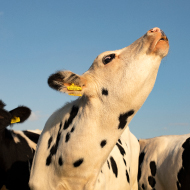
Results could help farmers to improve herd welfare
Research from the University of Sydney has shown that cows respond to emotional situations with an individual ‘voice’. Herds also identify and ‘talk’ to one another through an individual animal’s lowing.
PhD student Alexandra Green from the School of Life and Environmental Sciences studied a herd of 18 Holstein-Friesian heifers over five months. With assistance from colleagues in France and Italy, Ms Green recorded 333 samples of cow vocalisations and analysed them using acoustic analyses programs.
In the paper published in Scientific Reports, Ms Green determined that the cows used individual voice cues in a range of positive and negative emotional situations. This helps them to communicate with the herd and vocalise their emotions, be it distress, arousal or excitement.
“We found that cattle vocal individuality is relatively stable across different emotionally loaded farming contexts,” she said.
Positive contexts included oestrus and anticipation of food. Whereas negative contexts were when heifers were denied access to food or during physical and visual isolation from the rest of the heard.
This research confirms that cows maintain individual voices throughout their lives and in the herd, not just among cattle mothers and offspring.
Ms Green commented: “We hope that through gaining knowledge of these vocalisations, farmers will be able to tune into the emotional state of their cattle, improving animal welfare.
“Cows are gregarious, social animals. In one sense it isn’t surprising they assert their individual identity throughout their life and not just during mother-calf imprinting. But this is the first time we have been able to analyse voice to have conclusive evidence of this trait.”



 The RCVS has announced a new version of its 1CPD mobile app, with enhanced features for veterinary surgeons and veterinary nurses to record their continuing professional development.
The RCVS has announced a new version of its 1CPD mobile app, with enhanced features for veterinary surgeons and veterinary nurses to record their continuing professional development.